ERIK
SCOTT
The mwe3.com interviews
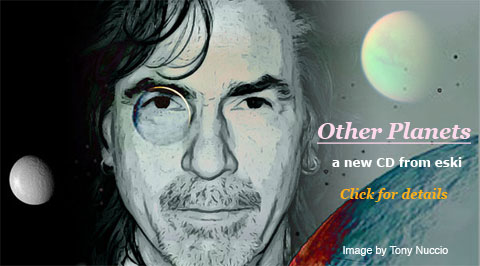 When
a great musician passes away—especially one with a number of
fairly recent albums to his credit—he doesn’t completely
die in the literal sense. His or her music also retains its earthly
spirit for the living to identify him. I say that not because I
wasn’t shaken up when I heard that Erik Scott had left the
earthly plane on October 11th, 2019. I say that because I, like
many other writers, music critics and fans will want to remember
Erik, with his nickname “Eski”, for his one-of-a-kind
music and looking back, his historical relevance as a go-to bass
player in the lineups of some very big rock music icons back in
the early days. He had told me he was quite ill and up to the end,
the last thing he told me was, “Forgive me but just I went
into the ER with a health crisis.” A brave man and a musical
genius is now part of what we living ones choose to call “The
Afterlife”. As a side-note, the day I found out Erik died,
something weird happened, something that never happened to me before.
I spotted a wild coyote running loose outside my home and then this
large coyote came right up to my ground floor apartment window and
gave a good look at me and my cat. Scary but illuminating, at the
same time!
When
a great musician passes away—especially one with a number of
fairly recent albums to his credit—he doesn’t completely
die in the literal sense. His or her music also retains its earthly
spirit for the living to identify him. I say that not because I
wasn’t shaken up when I heard that Erik Scott had left the
earthly plane on October 11th, 2019. I say that because I, like
many other writers, music critics and fans will want to remember
Erik, with his nickname “Eski”, for his one-of-a-kind
music and looking back, his historical relevance as a go-to bass
player in the lineups of some very big rock music icons back in
the early days. He had told me he was quite ill and up to the end,
the last thing he told me was, “Forgive me but just I went
into the ER with a health crisis.” A brave man and a musical
genius is now part of what we living ones choose to call “The
Afterlife”. As a side-note, the day I found out Erik died,
something weird happened, something that never happened to me before.
I spotted a wild coyote running loose outside my home and then this
large coyote came right up to my ground floor apartment window and
gave a good look at me and my cat. Scary but illuminating, at the
same time!
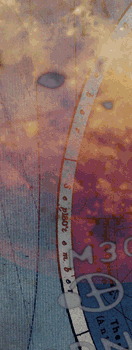 I
met Erik Scott back in 2011 in the afterglow of his album Other
Planets, which greatly impressed me at the time as a mixture
of instrumental New Age and jazzy, experimental music. His work
on the bass guitar was very phenomenal on CD and looking back at
the start of his coming later life career in his mwe3.com interview
from 2011, Erik told me, “After almost 40 years of recording
records with bands and touring to promote them, I just kind of stepped
off the bus for awhile. I really didn’t think anything about
what genre this music was going to be. I just wanted it to be cool,
and maybe show what could be done with the electric bass, and not
having a band or singers around me, there were no rules. Having
said that though, it really wasn't about the bass, it was about
making some cool music...and since I was the only guy there, I grabbed
the instruments I knew.”
I
met Erik Scott back in 2011 in the afterglow of his album Other
Planets, which greatly impressed me at the time as a mixture
of instrumental New Age and jazzy, experimental music. His work
on the bass guitar was very phenomenal on CD and looking back at
the start of his coming later life career in his mwe3.com interview
from 2011, Erik told me, “After almost 40 years of recording
records with bands and touring to promote them, I just kind of stepped
off the bus for awhile. I really didn’t think anything about
what genre this music was going to be. I just wanted it to be cool,
and maybe show what could be done with the electric bass, and not
having a band or singers around me, there were no rules. Having
said that though, it really wasn't about the bass, it was about
making some cool music...and since I was the only guy there, I grabbed
the instruments I knew.”
In its era, Erik’s music was quite revolutionary sounding,
bringing together a subdued, meditative kind of rock energy, underscored
by an irresistible instrumental edge featuring his ringing, bass-centric
ideas. It’s rare that a rock bass player would stretch out
as a New Age Jazz instrumental artist but, doing the revolutionary
on CD was Erik’s calling card. Still on the topic of Other
Planets, from that interview Erik also said “Some
compositions I started with a kind of a banjo type articulated picking
of the chord changes, like "Bartalk" and "Proper
Son", done on the bass with a chorale type effect, and then
played the melodic lead, again on the bass, frequently with effects
normally used on guitar leads. Then playing a vocal/string patch
on the keyboards gave me the idea to blend this warmer upper register
bass sound with steel guitar. I dug the warmth of this vibe a lot,
and used steel guitar on four of the tunes. I really had no idea
I was making what folks might call a New Age rock instrumental,
or 'ambient' music. After some time, I did realize that there was
a chilled out moody vibe to most of the music.”
After 2011, Erik and I met up again in 2014 for his second mwe3.com
interview, this time for his album And
The Earth Bleeds. As I started the interview off, I finally
asked him about his roots, and Erik told me that he was “Born
in Milwaukee Wisconsin, I was an Air Force child, as my father flew
the earliest jet planes. I’ve spent half of my adult life either
in Northern Illinois/Chicago or in California; first in LA, then
Northern California, which is a wonderful place to live.”
Although I didn’t now who he was in the 1970s, in that
interview I also told Erik that way back in 1974, I was lucky enough
to see him play with Flo & Eddie at the Troubadour in Los Angeles.
Around that same time, in the Summer of 1974,  I
also met Mark Volman and we had a little chat at a Market Basket
on Sunset Strip. That was L.A. back then: rock stars everywhere!
After reminding Erik about that show in that interview, I was surprised
he remembered it, adding, “But seriously, you were at that
1974 show? How cool is that! It must have been cool in the audience,
as the buzz went around: ”Alice Cooper is here with Keith Moon...
they gonna get up there?” I know I was buzzed in the band…the
brand new kid from the Midwest. Yeah? Alice and Keith Moon? Of The
Who? Yes, that era provides many memories and stories for sure!”
I
also met Mark Volman and we had a little chat at a Market Basket
on Sunset Strip. That was L.A. back then: rock stars everywhere!
After reminding Erik about that show in that interview, I was surprised
he remembered it, adding, “But seriously, you were at that
1974 show? How cool is that! It must have been cool in the audience,
as the buzz went around: ”Alice Cooper is here with Keith Moon...
they gonna get up there?” I know I was buzzed in the band…the
brand new kid from the Midwest. Yeah? Alice and Keith Moon? Of The
Who? Yes, that era provides many memories and stories for sure!”
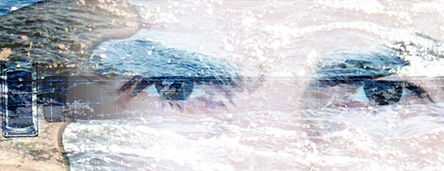 Comparing
his first 2 solo albums in that 2014 interview Erik said that “The
music of ‘Other Planets’ is very spacey atmospheric, and
using the steel guitar of John Pirruccello in combination with the
fretless bass really accented that vibe... spaceeeyyyy! Like going
to the planetarium. However, early in the writing process for ‘Earth
Bleeds’, I was writing melodies that had a real Celtic/Scottish
vibe, so I found Shira Kammen and her medieval violin, the veille.
When she kicks into the Scottish reel parts on “Battle For
Neverland”, it’s not real spacey, it’s real lively.
And it got me thinking “gypsy”, and I reworked a Spanish
melody and we recorded “Gypsy Mother”. To top it off,
I added Steve Eisen’s English whistle and Irish flute, John
Pirrucello’s mandolin, and while still atmospheric as heck,
we were no longer whirling around Jupiter.”
Comparing
his first 2 solo albums in that 2014 interview Erik said that “The
music of ‘Other Planets’ is very spacey atmospheric, and
using the steel guitar of John Pirruccello in combination with the
fretless bass really accented that vibe... spaceeeyyyy! Like going
to the planetarium. However, early in the writing process for ‘Earth
Bleeds’, I was writing melodies that had a real Celtic/Scottish
vibe, so I found Shira Kammen and her medieval violin, the veille.
When she kicks into the Scottish reel parts on “Battle For
Neverland”, it’s not real spacey, it’s real lively.
And it got me thinking “gypsy”, and I reworked a Spanish
melody and we recorded “Gypsy Mother”. To top it off,
I added Steve Eisen’s English whistle and Irish flute, John
Pirrucello’s mandolin, and while still atmospheric as heck,
we were no longer whirling around Jupiter.”
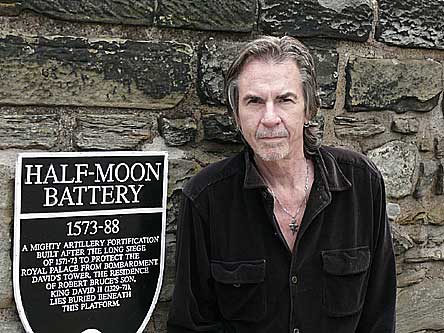 Erik’s
music was quickly progressing to another realm and it was working
out well and sounding great. Comparing the two albums, in that interview
I noted that, “Erik’s 2011 CD, Other Planets was
an instrumental music classic, although on And The Earth Bleeds
he blends in several vocal tracks amid his instrumental excursions.
Erik Scott’s sonically adventurous bass work on And The
Earth Bleeds continues to amaze, while some of the instrumental
tracks feature special sounding instruments such as pedal steel
guitar.”
Erik’s
music was quickly progressing to another realm and it was working
out well and sounding great. Comparing the two albums, in that interview
I noted that, “Erik’s 2011 CD, Other Planets was
an instrumental music classic, although on And The Earth Bleeds
he blends in several vocal tracks amid his instrumental excursions.
Erik Scott’s sonically adventurous bass work on And The
Earth Bleeds continues to amaze, while some of the instrumental
tracks feature special sounding instruments such as pedal steel
guitar.”
And The Earth Bleeds remains an eclectic music masterpiece,
this from a rock bass player making a name for himself in a completely
new genre was very cool. Erik summed up his approach adding, “But
you know, I did not plan on any of this. The way I worked on this
project was, there was no plan. For marketing purposes, I suppose
there should have been, but there wasn’t. I knew it was coming
out mightily diverse, but that probably reflects my career. When
you work with artists as diverse as Alice Cooper, Pops Staples,
Flo & Eddie, and Sonia Dada... Sonia Dada combined black and
white musicians with backgrounds in rock, gospel, R&B, psychedelic
jam bands, jazz, and folk, and I think some of these collisions
of musical cultures has influenced the unconventionality of my solo
work.”
 After
And The Earth Bleeds, Erik did another interview with mwe3.com
in 2016 for his 2015 album Spirits.
From that review / interview of his album, Spirits: “Erik
Scott has taken several of the vocal tracks from And The Earth
Bleeds and his 2011 album Other Planets and has reworked
them as instrumentals with new arrangements and new mixes. Commenting
on Spirits and the new mixes, Erik told mwe3, “It
is mostly a compilation of likely candidates from the first two
CDs, Other Planets and And The Earth Bleeds. Vocal renditions on
Bleeds, “Run”, “Free” and “Earth Bleeds”
have been rearranged into instrumentals, with the duet of fretless
and violin on “Free” and the duet of bass and English
flute on “Run” taking the place of vocals. There are some
remixes and re–mastering of course.”
After
And The Earth Bleeds, Erik did another interview with mwe3.com
in 2016 for his 2015 album Spirits.
From that review / interview of his album, Spirits: “Erik
Scott has taken several of the vocal tracks from And The Earth
Bleeds and his 2011 album Other Planets and has reworked
them as instrumentals with new arrangements and new mixes. Commenting
on Spirits and the new mixes, Erik told mwe3, “It
is mostly a compilation of likely candidates from the first two
CDs, Other Planets and And The Earth Bleeds. Vocal renditions on
Bleeds, “Run”, “Free” and “Earth Bleeds”
have been rearranged into instrumentals, with the duet of fretless
and violin on “Free” and the duet of bass and English
flute on “Run” taking the place of vocals. There are some
remixes and re–mastering of course.”
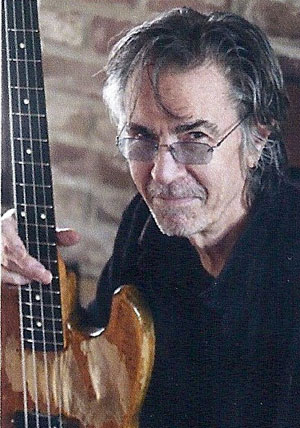 Commenting
on Spirits which also included his fabled cover the Beatles’
1965 classic “Yesterday”, Erik told mwe3.com, “With
Spirits, my intention was to stay instrumental and keep the sonic
dynamics in the same universe, to a degree, anyway. So I used new
instruments to take the place of any vocals from ‘Bleeds’,
and remixed the tracks to reflect a different focus. Some tracks
are very similar except for being re-mastered. Then I recorded a
version of the Beatles’ “Yesterday”, and put together
the tracks that best reflected this focus. If you have the first
two albums, you will find some tracks form a bit of a compilation.
If you don’t, well it’s all new then.”
Commenting
on Spirits which also included his fabled cover the Beatles’
1965 classic “Yesterday”, Erik told mwe3.com, “With
Spirits, my intention was to stay instrumental and keep the sonic
dynamics in the same universe, to a degree, anyway. So I used new
instruments to take the place of any vocals from ‘Bleeds’,
and remixed the tracks to reflect a different focus. Some tracks
are very similar except for being re-mastered. Then I recorded a
version of the Beatles’ “Yesterday”, and put together
the tracks that best reflected this focus. If you have the first
two albums, you will find some tracks form a bit of a compilation.
If you don’t, well it’s all new then.”
During the Spirits interview I also asked Erik about
his unique sounding fretted and fretless bass technique and the
inclusion of Baritone guitar to which he said, “A certain
amount of listeners didn’t realize it was a bass when I play
those melodic lines in the upper registers with the effects I have
on it, and since those melodic parts are in a rather unconventional
terrain from the more ensemble bass playing I do. I thought maybe
I should call it something different, so I labeled it baritone guitar.
Although I do use newer, brighter strings for those parts, it’s
the same old Fender bass I use for the low parts. Technique for
fretless: hmmm, well, left hand finger placement on the neck is
obviously more sensitive, for intonation purposes, and I wiggle
the notes less, which might be counterintuitive. On the fretless,
I do more bending and vibrato in the upper register melodic areas,
and some folks mistakenly take it for fretless, because of that
vibrato and wiggle.”
I was lucky to conduct one final interview with Erik for his
2017 album, In
The Company Of Clouds. Looking back, that album’s leadoff
track “Nine Lives” was perhaps a pre-curser of the tragedy
to come. Erik was already being attacked health-wise and from that
interview he told me, “While it’s true that I was diagnosed
with cancer of the esophagus in February 2015, and spent most of
that year in chemo-therapy and radiation to fight it off, thankfully…the
title “Nine Lives” is more about myself musically.”
From that In The Company Of Clouds interview on mwe3.com,
Erik also said, “Up until the last two records, I suppose
I had a rather artistically arrogant attitude about intentionally
writing and producing the music for any certain ‘genre’.
I didn’t like to do it. To my mind, premeditating the music
restricts it in some ways. But with Spirits and In The Company Of
Clouds I intentionally tried to produce and arrange the musical
ideas in a less wildly eclectic manner, and it was easier to find
a home... under the ever-broadening, non-mainstream world of the
New Age and contemporary instrumental universe. To a degree, I occasionally
have to lasso a few ‘rock’ tendencies when my emotions
take control, unless of course I am making a rock record.”
 In
The Company Of Clouds featured some well-known guest artists,
and as I noted in the album review: “On the nine track In
The Company Of Clouds, Erik is joined by pedal steel guitar
ace John Pirruccello as well as guest artists that include rock
guitar legend Steve Hunter, New Age guitarist Jeff Pearce, guitarist
Phil Miller, along with a range of other artists who help Eski flesh
out the sound stage.”
In
The Company Of Clouds featured some well-known guest artists,
and as I noted in the album review: “On the nine track In
The Company Of Clouds, Erik is joined by pedal steel guitar
ace John Pirruccello as well as guest artists that include rock
guitar legend Steve Hunter, New Age guitarist Jeff Pearce, guitarist
Phil Miller, along with a range of other artists who help Eski flesh
out the sound stage.”
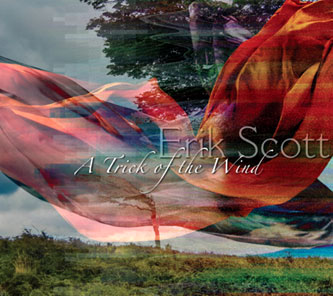 Anyway,
life’s too short and 2019 rolled around and during that period,
Erik released what looks like his final album, called A Trick
Of The Wind. More subdued and instrospective perhaps than his
other albums, A Trick Of The Wind nevertheless features some
stunning musical moments enhanced by Erik’s work on fretted
/ fretless bass, eBow bass, keyboards synths, electric sitar, percussion
programming, bass- generated fx and vocals. Mostly instrumental,
A Trick Of The Wind features several wordless vocals from
a range of singers, along with guest artists like John Lutrell (guitar),
Jeff Pearce (guitar synth), Jeff Oster (trumpet, flugelhorn) and
drummer Celso Alberti. Also here is the steel guitar magic of John
Pirruccello, who is/was so much a part of Erik’s first solo
albums. As some writers have noted, A Trick Of The Wind features
a haunting cover art, which is par for the course for an Erik Scott
album and then there’s Erik’s liner notes, which are kind
of prophetic in a way. As you can also hear, there’s a gospel
kind of tinge to the wordless vocals, which forms a kind of soundtrack
of God opening the gates of heaven perhaps, befitting a great musician
and an equally important artist on the contemporary instrumental
music scene.
Anyway,
life’s too short and 2019 rolled around and during that period,
Erik released what looks like his final album, called A Trick
Of The Wind. More subdued and instrospective perhaps than his
other albums, A Trick Of The Wind nevertheless features some
stunning musical moments enhanced by Erik’s work on fretted
/ fretless bass, eBow bass, keyboards synths, electric sitar, percussion
programming, bass- generated fx and vocals. Mostly instrumental,
A Trick Of The Wind features several wordless vocals from
a range of singers, along with guest artists like John Lutrell (guitar),
Jeff Pearce (guitar synth), Jeff Oster (trumpet, flugelhorn) and
drummer Celso Alberti. Also here is the steel guitar magic of John
Pirruccello, who is/was so much a part of Erik’s first solo
albums. As some writers have noted, A Trick Of The Wind features
a haunting cover art, which is par for the course for an Erik Scott
album and then there’s Erik’s liner notes, which are kind
of prophetic in a way. As you can also hear, there’s a gospel
kind of tinge to the wordless vocals, which forms a kind of soundtrack
of God opening the gates of heaven perhaps, befitting a great musician
and an equally important artist on the contemporary instrumental
music scene.
Just this past July 2019, Erik sounded excited about A Trick
Of The Wind and he emailed about his new album and told me,
“It has done very well. Nominated for Album of the Year
and Best Contemporary Instrumental at ZMR, OWM… Also nominated
at the 4 Global Peace Song Awards and The IMA's. I won “Producer
Award”. The Best New Age album nominations I think are nice
nods of approval, but in that category, almost every album in the
top 5 "Best New Age" category, are more 'New Age' than
mine, so I get it. The awards won are usually in the Best Contemporary
Instrumental category, which makes sense. It has a track "Ghosts
of Storyville' nominated in the Jazz category at the Peace Song
Awards, which is interesting, but the track does salute the inventors
of that music in 1900... JAZZ, so it makes sense as well.”
 Words,
in and of themselves feel carved in stone now when it comes to describing
the magic of Erik Scott’s music. With the fires raging in the
skies in his adopted town, life has truly become much harder now
than even 20 years ago. Those who want to hear and learn more can
always go back and read these mwe3.com interviews with Erik Scott
and his insightful words regarding a series of intriguing CD releases
from a most intriguing artist. In the early 21st century, we all
live in the age of the internet, magically reaching across continents
in mere seconds. Maybe we didn’t hang out like people did in
the old days, or speak on our cell phones, as is the custom in the
2020 era, but I will always appreciate Erik Scott for being the
musical innovator he is. ErikScottBass.com
Words,
in and of themselves feel carved in stone now when it comes to describing
the magic of Erik Scott’s music. With the fires raging in the
skies in his adopted town, life has truly become much harder now
than even 20 years ago. Those who want to hear and learn more can
always go back and read these mwe3.com interviews with Erik Scott
and his insightful words regarding a series of intriguing CD releases
from a most intriguing artist. In the early 21st century, we all
live in the age of the internet, magically reaching across continents
in mere seconds. Maybe we didn’t hang out like people did in
the old days, or speak on our cell phones, as is the custom in the
2020 era, but I will always appreciate Erik Scott for being the
musical innovator he is. ErikScottBass.com



